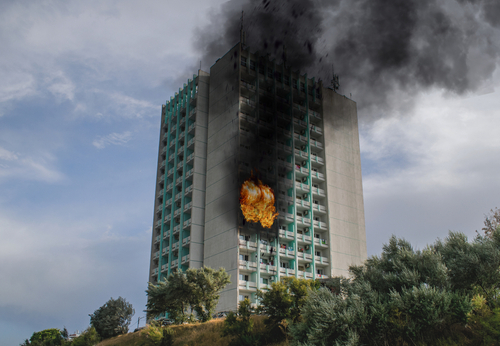
Members of the Fire and Security Association (FSA) will be well aware of the Regulatory Reform (Fire Safety) Order 2005 but some may be less aware of the Fire Safety Act 2021.
This recently introduced legislation is one of the most important outcomes of Dame Judith Hackitt’s inquiry into the Grenfell Tower fire of June 2017. While the Fire Safety Act 2021 does not introduce anything startlingly new to our sector, it puts yet another spotlight on the crucially important area of competence.
The 2021 Act currently covers and extends the remit of the Fire Safety Order 2005 where there are multi-occupied buildings (with two or more sets of domestic premises) to cover the external walls, structure and between domestic premises and doors to common areas. The Order requires that each of these buildings has an appointed ‘Responsible Person’ who oversees crucial aspects such as fire safety.
The ‘person’ is generally an employer in a workplace or in control of premises in connection with a business and might be a leaseholder or building owner, an individual, organisation or business. The Responsible Person must in turn appoint ‘Duty holders’ to carry out fire safety-related activity, including the installation and maintenance of fire alarms. The Fire Safety Order also states that these Duty holders must be ‘competent’ to carry out the work.
FSA members working on fire systems may well find themselves in the role of Duty holder as defined by the Order and when they do, recognition of competence is vitally important. Unfortunately, ‘competence’ is yet to be clearly defined for our sector, and simply recommending competency does not go far enough. We would like to see competency properly defined, agreed, and then mandated in law.
It is currently possible for businesses to demonstrate business ‘competence’ through third-party certification through schemes from organisations such as BAFE or LPS. Generally, public sector clients will often request evidence of this as part of the audit process, but some commercial clients tend to be less aware of the benefits of working with third-party certified companies.
A crucial point is that third-party certification may relate to the business, and not specifically to individuals working in it. This is where the Fire Safety legislation poses a challenge for the fire and security industry, as there is currently no universally recognised method of validating individual ‘competence’.
Many have entered the industry through the electrical apprenticeship pathway, followed by specialist training modules on fire alarm systems, covering anything from design, installation, commissioning, or maintenance. However, much of the workforce have not had the opportunity to acquire these core skills. Even though these individuals may be able to deliver installations or maintenance to a suitable standard, lack of validation could soon be a problem.
Until such time as we have an agreed definition and validation method for competence within our sector, it is difficult to identify what training might be appropriate for industry newcomers, or for those already working in it. One approach may be to ensure operatives have taken a regulated apprenticeship such as the Level 3 FESS standard or an equivalent existing worker assessment which is mapped against the standard.
Reputable businesses in our industry will not object to investing in training, although these schemes may require a significant budget allocation, as well as resource issues due to the loss of working time for engineers in training.
It is a fact of life in our business that unless legislation requires it, many of the decisions made about procuring our services are cost-based. This is particularly true in an industry that is also facing economic pressures from other factors linked to supply chains and rising costs.
It is therefore frustrating that pursuing sufficient training is left to the discretion of individuals. Nothing is more likely to deter much needed, widespread training in our industry than knowing that companies with less competent engineers may successfully bid lower because they do not invest in training or competency schemes.
FSA is ably represented on the post-Grenfell industry Competence Steering Group WG2 which is compiling a competency framework to raise standards across the construction sector.
Currently, we have qualified electricians on-site who can work as fire alarm installers. We also have dry liners on-site working on passive fire-stopping systems. It would make much more sense to bring all these skills together under one widely recognised - and mandated – competency card scheme. Ideally, the scheme would include a requirement for Continuing Professional Development (CPD) to ensure engineers are up to date with the latest standards, technology and techniques.
The Health and Safety Executive has pointed out that in our post-Grenfell construction industry we need to consider fire safety as a holistic system that works all the way from design through construction to occupation of a building. A mandated sector competency framework that encompasses all the skills required to design, install, commission and maintain fire safety systems would ensure that our sector can offer true ‘competence’ in the broadest sense.
While we recognise that there is a cost to this approach, it’s also a vitally important investment in the future of our industry, as well as a major benefit to clients and building occupants. It is the only way to achieve recognition for those businesses that want to work to suitably high standards – and who are willing to put in the time and effort to show that their engineers have the skills to provide these safety-critical systems. Our industry deserves to be supported by clear legislation on this crucially important issue.
FSA Committee Member Gareth Selway is MD of Firerite UK and Director of Fire Industry Training Academy

